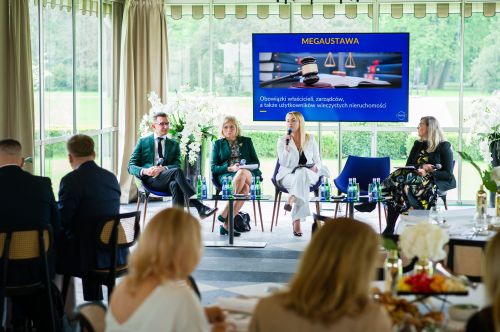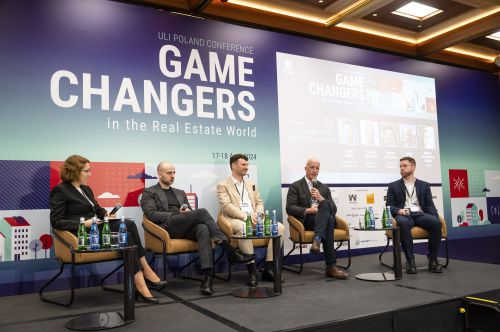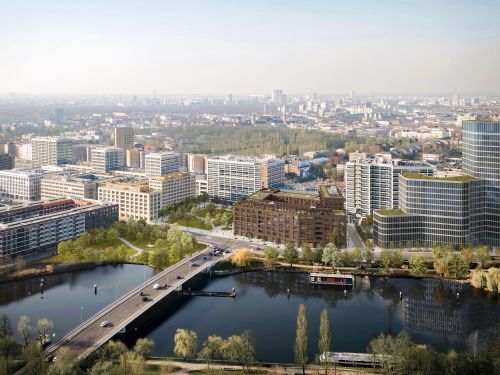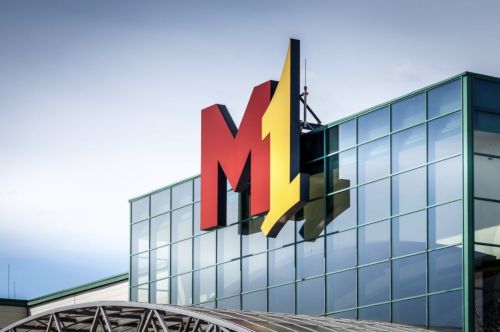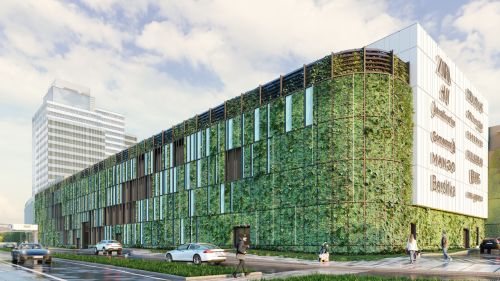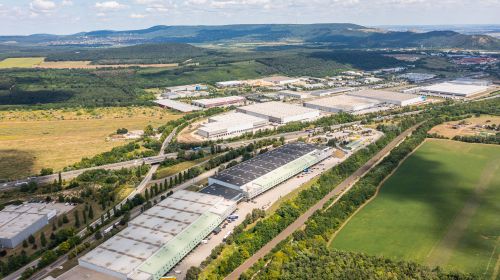Patience makes perfect
Feature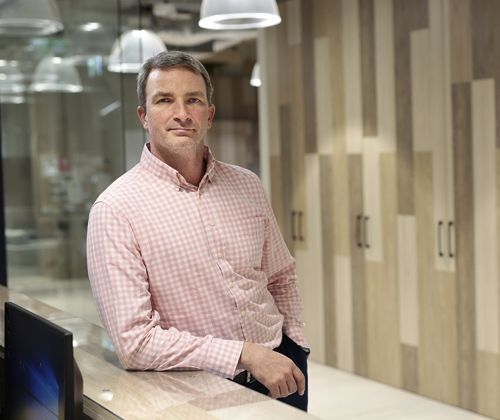
Tomasz Szpyt-Grzegórski, ‘Eurobuild Central & Eastern Europe’: This year marks the 25th anniversary of HB Reavis’ existence. What have you managed to achieve in this time? And how does the company plan to celebrate?
Pavel Trenka, group CEO, HB Reavis: We started as an agency, but after a few years we began to operate as a developer – if only a local one at first, but later we became Central European and now we are international. Our ambition was to function differently than other companies – to set trends and find new ways to do business. We don’t know yet whether or how we will celebrate the anniversary. We’ll talk about it with our shareholders.
What was 2017 like for the company?
Pavel Trenka: We don’t yet have a financial summary of the year, but I can say that we probably maintained our average performance from previous years. We have had ups and downs, some projects were delayed – that’s nothing special in this sector, where it’s not always possible to get a building permit within the envisaged time – but we are up to speed. Depending on the country we are operating in, we face a variety of challenges – most of them conditioned by the local political situation rather than our actions.
Has politics become so important when operating a business?
Pavel Trenka: The political scene in our region of Europe (and not only here) is changing, affecting the conditions for running businesses and leading to design delays in Warsaw, Prague and Budapest. Perhaps these are not crucial issues, but they don’t really help either. Brexit is certainly not helping us in London. We have not had to contend with any problems more serious than that, but it shows that in business terms it slows down the whole process. However, we entered that market with a long-term view and can see that it is built on strong foundations. I think that Brexit will pass and London will stay one of the most important cities in Europe. Hence our plans to continue our involvement in this market, as is confirmed by our purchase last year of Elizabeth House (One Waterloo). And we are currently close to finalising another purchase in the UK capital.
Will it be something substantial?
Pavel Trenka: No, it will be a smaller project than last year’s – around 20,000 sqm. This is a reasonable size in terms of the conditions in London, although in our region it would be considered too small for our capabilities and plans.
HB Reavis has around 1.3 mln sqm under construction or planned. Is the company thinking about listing on the stock market?
Pavel Trenka: We are considering ways of increasing our capital in the wake of our decision to invest in large projects. So we’re investigating our options. An IPO has not been ruled out, but this would not be an end in itself.
What plans does HB Reavis have for 2018?
Pavel Trenka: Our plans are quite clear because we started three major projects last year – Varso Place in Warsaw, Nivy Station in Bratislava and Agora in Budapest. These are our priorities in Central Europe. In London, on the other hand, we are redesigning last year’s purchase. We have also decided to act more decisively in Prague, while we will be developing our HubHub concept and our workplace advisory Origameo.
Are you going to enter other markets? What are your investment plans?
Pavel Trenka: Our focus will continue to be on the countries where we are already present. We are building a team in Germany and intend to make our first few purchases there this year. Our target is Berlin and Frankfurt. We are interested in plots where we can develop about 50,000 sqm of offices or neighbouring plots that provide expansion potential. An opportunistic purchase of a smaller property hasn’t been ruled out in order to build a team around the project. In Poland we have two major projects: in Warsaw and we have debuted in Łódź. As far as new purchases are concerned, the basic question is: is the time right for this? We have been seeing increased growth for many years, so a correction should be expected. Obviously we are looking at the options for rebuilding our land bank, especially with a view to projects that would be completed after 2021. But our focus is on our current projects – Varso Place and the project at ul. Burakowska.
Stanislav Frňka, Poland CEO, HB Reavis: If we look at our ten-year involvement in Poland so far, it should become clear that we made purchases in the post-crisis years: 2010–2012, when sellers’ expectations for land prices were not so high. We had been looking at the Polish market, such as a site on ul. Konstruktorska in Warsaw, back in 2007, but the price level was so high that buying was not an option. Two or three years later it was a completely different story, as prices had fallen by two-thirds. We had been preparing for this and in a few years were able to acquire the large land bank we are currently still building on. In the meantime we bought a plot on ul. Burakowska and in 2017 we acquired one in Łódź, where prices are at a different level than in Warsaw but rents are similar to Warsaw’s Mokotów district. Land prices in Warsaw have been boosted by residential developers, who can afford more expensive purchases as their market booms. Office developers, however, are not buying too much for the time being.
Pavel Trenka: Our business is cyclical. We have to keep a close eye on the phase of the cycle we are in.
So when will we start going down?
Pavel Trenka: If only I had a crystal ball... Returning to shopping: we will probably make another acquisition in Budapest this year. However, our biggest aspirations in terms of purchases in Central Europe concern Prague, where the lack of new office stock is clearly visible. However, this city is very challenging. We recently took the decision not to take on a large project there. The process for obtaining building permits in Prague is a tricky one, because it is unpredictable. This means that investing in large enterprises there is very risky.
What is the general investment climate in our region?
Pavel Trenka: A lot could be said about this, but I have my own test for the investment sentiment in a particular country. When I get on a plane to another country, I look around the passenger area and check how full it is on a working day.
And how many business people came to Warsaw today?
Pavel Trenka: The plane was half empty and no one was sitting in the business section. This is the definite sign of a slowdown and is nothing like how things were in 2010–2011. Then it was even hard to book a seat.
What’s the situation in the other office markets in the region from a developer's point of view?
Pavel Trenka: As I’ve already said, Prague looks very attractive. If we had a leased project out there now, it would sell immediately. There is very little in the way of vacancy, since there is not much new supply and the demand is strong. Budapest also looks good. This market is on the way up and we are a little ahead of the game there, because we bought land at a time when nobody wanted to invest in the city. So our anti-cyclical approach has turned out to be a big advantage for us again. Bratislava, meanwhile, is a market dominated by a few major players. The demand there is substantial and we are not even able to develop enough space to satisfy the demand.
Have you considered investing in Romania?
Pavel Trenka: We have looked at this market several times in the past. The last time was two years ago. However, we have concluded that this is not a good time to enter this country. 2010–2011 would have been a good time. However, we might consider this market in the next cycle.
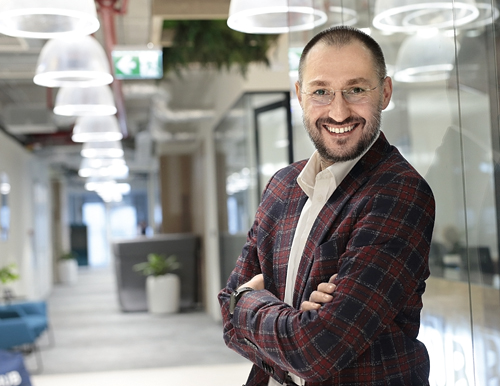
Is HB Reavis just about offices? The company also has retail projects in Slovakia. Do you also intend to operate in this segment in other countries?
Stanislav Frňka: In Poland we have been looking for such an opportunity for many years – land as well as older assets in need of redevelopment. However, the retail market is highly saturated and sellers’ price expectations are such that it is difficult to make a project of the scale we are interested in and that would work out financially.
Pavel Trenka: We approach marketing projects more opportunistically than strategically. Offices, which we are focused on, are the basis of our approach. Retail is very interesting from a theoretical point of view – we like the complexity of these types of projects – but we can now see a strong trend towards online retail, so we are only interested in the most prominent locations because, whatever happens, they will still function as meeting places for people. They might require a change of character – from typical retail to being more service or entertainment-oriented – but whatever it is, their location will remain their strong point. The problem is that it is very difficult to find such opportunities.
Stanislav Frňka: The old rule of thumb of real estate, ‘the three Ls’ – location, location and once more location – is even more the case when it comes to retail.
Let’s get back to the office market. How do you assess the situation in Warsaw?
Stanislav Frňka: 2017 was a really great year. The high demand for offices meant there was a decline in the vacancy rate. Not many construction projects are planned for 2018, so vacancy will continue to fall. If we continue to see so much interest from office tenants, this year could be even better than the previous one. Unless there is not enough space. We intend to develop our HubHub concept in the centre of Warsaw but we are currently having problems finding the right place for this. And I’m not talking about premises of 10,000 sqm or bigger – only of just over 2,000 sqm. This leads me to believe that the city could be returning to single-digit level vacancy by the end of this year. I also hope that it will finally dawn on tenants that they cannot continue to be so demanding as the market will get into balance again.
Does this mean that companies are also able to pick and choose when leasing space in Varso? Have any new tenants appeared?
Stanislav Frňka: A year ago, we announced that Cambridge Innovation Center would be a tenant and now the details of this lease are being finalised. We are also talking with a few other, very large tenants.
What does ‘very large tenant’ mean?
Stanislav Frňka: A company looking to rent more than 20,000 sqm. I was hoping that we could conclude one of these contracts last year, but I think that we will soon be able to announce the signing of this contract.
Who with?
Stanislav Frňka: This tenant wishes to remain anonymous until the end of this year. But consultancy and law firms are very interested in our project – especially when it comes to space in the tower. The highest building in the project should be ready in H2 2020, so there is still time for negotiations. The project has been enjoying a lot of interest, but we are also aware that the intensity of the competition has to be taken into account, as it should come into use in 2019–2020.
And when will you start working on the skyscraper on ul. Burakowska?
Stanislav Frňka: We will decide when to start as soon as we receive the building permit.
HB Reavis has recently announced the purchase of a plot in Łódź. What is it about this city that is making everyone want to build there?
Stanislav Frňka: Łódź was asleep for many, many years, but when its current mayor began to work on the city and develop it, this stimulated great interest among investors. Łódź is located an hour from Warsaw by train and is cheaper than the capital city.
Even cheaper than Służewiec in Warsaw...?
Stanislav Frňka: Let’s put it this way: Służewiec is suffering a little now, while Łódź is comparable in terms of the price, but the labour force is cheaper than in the capital. Talking to Łódź city council we were told that many people moved from Łódź to Warsaw in the past, but just recently they have started returning to their city. And the goal of the local authorities is to generate jobs in the city. I think it’s all going in a good direction.
What do you want to build in Łódź?
Stanislav Frňka: We have bought a plot on which we are planning an office project of around 30,000 sqm. Services and retail will also be situated on the ground floors. However, we are still considering exactly what to build. There are also two historic buildings and a chimney on the site, so this is an additional challenge for the architects who will be designing this complex. We aim to create something extraordinary there.
Are other cities in Poland also interesting for the company?
Stanislav Frňka: We have been monitoring the situation in the largest cities, focusing on Kraków, Wrocław and the TriCity. We would definitely like to build something in Kraków, but it is not so easy because the numbers need to add up. Kraków, like Prague, is a difficult place for the implementation of large projects. As is the case in Wrocław. Maybe things are a little different in Gdańsk and the TriCity, but the economic calculations are against it. In addition, the local developers are strong there, so you have to weigh up the competition from them. Perhaps Wrocław is the exception, since it has more international companies operating there.
What are the biggest challenges that your company will have to face this year?
Pavel Trenka: There are a few. First of all, we need to be patient because we can see that the market is in the later stage of its cycle. So we have started disinvestment on a large scale to give us the capital for our next move. At this moment we have raised around EUR 250 mln, which has not yet been put to work, since we have to be patient and wait for the right moment of the cycle. The second important challenge is to maintain the company’s growth during this period. People should be able to see that the company wants to grow. We are developing new business consulting lines in the workplace field while extending and deepening our knowledge and opportunities in terms of intelligent construction in order to meet the needs of our clients and create a unique range of services for them. It is a good time to invest in such projects – we should now be building the right teams of people with the right know-how instead of buildings themselves.
What will be 2018’s biggest challenge in Poland?
Stanislav Frňka: The most important thing is to meet Varso Place’s deadlines – but this is a very complicated project. The challenge will also be to maintain the project budget when construction costs are rising. However, I can reveal that the companies working for us on Varso Place have been able to limit their financial expectations in exchange for the references they will receive for their involvement in such a demanding and complexed project. In Łódź, meanwhile, we will be designing and applying for the permit for this project, as we will for the office building on ul. Burakowska in Warsaw.
The two chiefs
Pavel Trenka, CEO of HB Reavis Group
Pavel joined HB Reavis in 2007 and has since been responsible for the group’s overall strategy and international expansion. His previous positions include associate partner at McKinsey & Company and an investment banker at IB Bank Austria. Pavel is a graduate of The University of Rochester’s Simon Business School in New York.
Stanislav Frňka, CEO of HB Reavis Poland
Stanislav is responsible for overall business management and development across the Polish market. He was appointed to his current position in 2011. During his tenure the company has become one of the top three most successful developers in Warsaw. Prior to joining HB Reavis, Stanislav was employed by Benefit Finance. He graduated from City University of Seattle in Treňcin, Slovakia, where he majored in business management.












